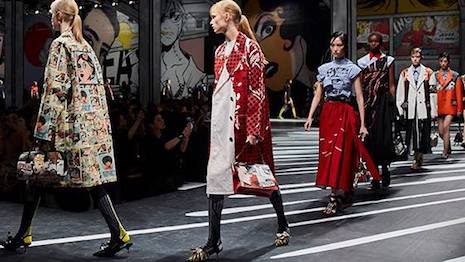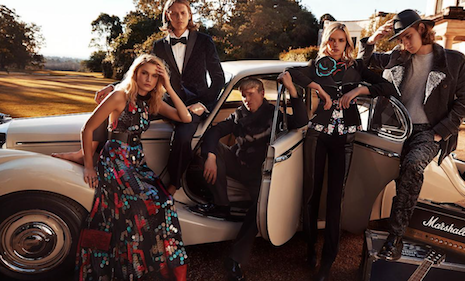While Italian brands have a strong heritage and tradition, they should also focus on innovation and creativity to drive growth, according to a new report from WPP and Kantar Millward Brown.
Luxury brands dominate the Italian-focused BrandZ rankings, with seven of the country’s top 30 most valuable brands, led by Gucci. Italy has a reputation for producing fine foods, fashion and cars, leading to a heavier concentration of premium producers among the nation’s top brands than is seen in most other countries.
"Gucci is a truly global brand with a rich heritage, which over the year has been able to evolve, staying true to its original values yet reinventing itself to remain relevant to the youngest target," said Roberto Rossi, head of creative and media at Kantar Millward Brown, Italy.
"Innovation is a key driver to Gucci’s success," he said. "Through innovation they kept the brand relevant to new generations of consumer such as millennials, with online sales now representing a significant part of their business."
The BrandZ Top 30 Most Valuable Italian 2018 Brands uses consumers insights to measure the valuation of brands. The brands studied for the rankings had to have originated in Italy with public financial data.
Made in Italy
Together, Italy’s most valuable brands are worth 72.5 billion, or about $89.3 billion. About a third of this total comes from luxury companies.
Gucci tops the list with a value of around $16 million. The almost 100-year-old label has seen an 8 percent growth in brand value over the last year.
Today Gucci ranks third among global luxury labels, with BrandZ placing it behind only France's Louis Vuitton and Hermès.

Prada's spring/summer 2018 show. Image credit: Prada
In the Italian rankings, Prada comes in at number five, while fashion labels Bottega Veneta, Salvatore Ferragamo and Fendi also make the list. Automaker Ferrari placed sixth, and jeweler Bulgari had the 26th highest brand value.
One of the key factors driving growth for the top 30 was a sense of trust, with many of the brands gaining consumers’ repeat business and recommendations over the years. The report suggests that brands highlight why they have been around for decades, using it as a differentiator and marketing tool.
For instance, Armani is one of the most trusted Italian brands.
However, while age can be a benefit in attracting a loyal customer base, more established brands need to be watchful of startups and newer entrants.

Armani is among the most trusted Italian brands. Image credit: Armani
The cachet of Made in Italy is appealing to consumers, as the country is known for its culture and placed 15th in the Best Country rankings by WPP’s Y&R BAV Group.
But the popularity of this positioning has also led to imposters. Italian brands therefore need to highlight their authenticity to maintain their point of differentiation in categories including food.
According to the BrandZ analysis, the healthiest brands have a clear purpose, positive brand experience and strong communications and marketing. They are also innovative and attract love from consumers.
A key aspect of brand purpose and innovation today surrounds ecological efforts.
For instance, Italian fashion label Salvatore Ferragamo demonstrated its commitment to sustainability by planting an urban wood in Florence.
In honor of National Tree Day, Ferragamo began the creation of Parco delle Idee, or Park of Ideas, inside the University of Florence’s Polo Scientifico of Sesto Fiorentino. While a physical example of Ferragamo’s desire to be greener, this initiative is also a means for the company to give back to its native Italy (see story).
"Balancing heritage and innovation could be a very tough challenge if you don’t have a clear vision on what makes your brand meaningfully different in consumers’ minds, and on how connectivity and new media are evolving today’s consumers and their relationship with brands," Kantar Millward Brown's Mr. Rossi said. "Online platforms and digital technology can help brands establish a new and modern relationship with customers."
Cultural leadership
Italy ranked first in heritage and cultural influence in the Best Country rankings. The nation's cultural positioning has had an impact on its industries, particularly luxury.
Bottega Veneta and Missoni are among the luxury labels featured in a new exhibit at Palazzo Reale that aims to place fashion history within a broader cultural context.
“Italiana: Italy Through the Lens of Fashion 1971-2001,” presented in partnership with Yoox Net-A-Porter Group, follows Italy’s fashion industry as it morphed into a more global business. While marking key periods in Italian fashion, the exhibit also functions as a celebration of the 60th anniversary of Camera Nazionale della Moda Italiana, the Italian National Chamber of Commerce (see story).
"Italy stands out for being culturally influential, rich in heritage, friendly and scenic," Mr. Rossi said, "[These are] values and associations that can effectively help Italian brands moving abroad, especially for luxury brands, which can benefit from what the world associates with Italy itself yet at the same time have helped shaped those associations over the years thanks to the value of their brands."
{"ct":"B5njTiAONtxQsaxTLXwxPEYnx\/P+pY8Id2nQajR7HFiPtVcOlw\/B4z6QudqcB28GVzErRKnGuKvzj3aH5kiVHwszj+49kXzgL4yXmkpGa2Tv70o4UVNlWliHsCWG6zy7gz99ThhhZ159+uZcZ6qZKlCpvbSIpPJtoOkRTTMlMQGEUUSo91M5rg0kUlmlaRkg9IF2f\/9FoB5Bz0NWR2SM\/mBhDF3De9FfjfMqNRQVn4TyU7yHJGO4FtsPYHvLs+OZ9pYs1lPQsBQdPiDmz3d7Jb2nmkfrxjzRDlc4lz5VMyk0L3EGEWW4NsJFB68IVXGP8\/yuVCXdy34ULWoqvQbTJrM3e8jEe4F\/zIOHHXbIBlRD9gA4B6w607\/vBkIrKxHbSgPC56TC3pT48sP953EjKbVsqwZYA6ISYv0JI4ZBJZGb848nU\/6QNcfImvf2yuTtvIanKsA6r4blMDojje1M4af9EUc34o2yDyO0FD9jMiTcJ77WpXLtGbUTuFXseWqzV85qYmmGC2FS2pG+WmwIbkCnthqxdRmoio2Ozxyet1PUQIJIrFGoyGSHk+wbDu58KCq\/FDeASeaD2Voga7VP3zHdwTwX\/vis0beeS4df1atnybIQhzxCdMy8IcAYsid0FH3\/zqkM0XdRqS5pwPsyogC9+LS6sCWZpQafH1s6LjUme7ele2E533SAL23UhcgqoWJVoQaLMCIBMG430nMtEJlCgVY8S95SA16Nk4OcstHW0f6bPbkyIePrrK7HKkZiON\/f+qDtQPxKP5v6As35oowqKWHn8YR2OLsAIvUgEs0Vi2IFHxIxNV7s+wTFnafwz3Sz9pfR8EoelT2wXl5Bt9NoaYC7iwYglbrWl\/+RP0kCbAoLpgUNwCQ4Qc285tkoK1ZukvfVXKN9w2gtthIPzSIXrjWYnMRPgiePj3jwf0meEw4vTQy02OFNkLzijnczejabK2m\/w5maBO0gel5xY7IItIRnaRhnT5NZUrC4ekF8W8wg14DsgmfjbU2OzK3TH0tJyH6XkeZZCY3dSA9Bl43EK0wwnDfkEfoL5OlGMHaBGnlFqbVp\/3yk4A+VOTuQ1Qsc0ijILUgaG7NGPWZwAtnjWWY4DQz7sdkvFh58hL4AQ2dE6dv3oZFuW9MCTF\/YCkz5LYz7S7o0O4THtD8Lg\/dof5MJgr4kckQ3g9bEleaHe63CHfBX1KCAw1UybTw5cmSt0rZQkPzFKclGwRT+t1dHMUqn69Zy6lruN\/gI19YSsXXvC3udpAVO0xkOZRwr3WV+9sKDG5MbzEDraiQ2Yo6dHph5kAuqsStXQGgh1j61EG6XzvvT6p9qvuM1bGfTauBeDkZSbjX3wZTL0QnbozYa2cQpwSkVaJgjTo46XfuPk3hvmzqG+47OOLStx+1MlCR\/crqsP5DH8Od7lkCatsSRpvvL51ZU4Qt5isL5OvXMGLtJYiiBPISmyj\/O7nGebrMMM5UNoJW\/18uC4rIuLlFnlzU5M5lgzjldQJKyjWdYCxfCRzHd\/H8a+WihvUUTynWvUBQoSlVSw0Y7Us5IMi8v+JcF3YotemgEILrQneQQkSfZgx8ZI5uE4p1BWx5czCcnzwliMumIouGfYLNamSU7ZMWRxsFz2Z0FouDTev3vnyl\/vqC0kBSeFQROO2asryyJTmTvY41\/N+ue0MDg3zQOUiwRdI9pvmyNMPPTCQwRqHhKpn+2ta0y6Th50qPslJm4k\/x8Pb4awPqxLuW12iQSKCh32jnIdU1Q3tEe\/iIK0HkbQ86i8hcRhWM2VindXSPoCm4fC454O5HvPsulAvrp4iJsk\/2qrfApu4MEYufyfT8vO4HxMgZl496CzQVkC6zk4O7Du3Io5Yt4A8aq8N1+eewWrw207pIq2vbIHYR8ENgeb62ElE6YfHmS8iHPrffDVj8R8V3Q541hGlBwhqhv1lMdLWc3KJ4yw7\/46SdBkZ5JkkTMWtkKnH\/sKCjynukiNMJjgF1JDSUCjyYCRVY2NnBAiEpZtHUBGawSFCgzW4OFUqojUTG3dGZ4bmucd9Baz5SOTa26x+zendGWK10xbiBuefN78cHxIQ6YKI48\/KM8ZeluhrslehujDs4LwHz8dZhogPlodK99ADgWnx1d6ZLXYDhJH29J6vxRQU3wEpLypST7YQUdB5gnunW\/Lo3Lk9onIAUn2aMMgVuqlIkvzsqqjxzEGd2AvKeo\/b3796FKOe5FwZ\/UXCXQ3q4o2OVMcED23FFAVZLrEWdKur7eP+aB0m8f3rcpshLgTOCr+AQ9\/4qRmCRpkPIM53iDBp6st02wIO3sr7eb1lY+OcC6vxsrApJUIr3TiCPFGapNAEBZmWAYVQNF9e+WoTBdT2t0CKuo6hmufKVdeanYOjXjMqV1lEtJbhwtdEprhRYZSyz2rDIFoFb1LpQCU5qJhopoP2DXcABxKSe1b+L6cDfO\/vFWXGjCAWO5CLaC62MMA6q8SNKniG0EbMPmsjG0DhPiBUQDvsfPsE7EC4T4nfrsg5xtmIfLtDnr3zcU61JAmOP5oOQT2kLYwYgSLO4RZRuGavBnkBl4RgzsQN\/wf2STCOsvssvWSm52mf3AJV4YApdr3V2Mhto6pEk92SMX7taBFm2BCyobuK1EyfOsB8JgBcs6iN+BsgHePaN5QijgZ9suUCLCNrQngxUgR4jgxmptiPyYv1iZ2MvXGC2lLwTwotZn55VroBup1E3XB2dd9RDKZFagmOfe8Ia4u\/\/bgCflJvY5NNW+ttqYXWvdTRXFygwtIQG5cplxkQSyIpnbA2AfVTQdicBdi90zxLIzdcG3hMxeLnsH1Ny7RKDOynG\/ZkH8dAqmZotzUpfxYslP1Xuv3EJCaW8TGM4LUNr2hEtgRZkj1SKeKK9+++OMxeeclH4jnxU\/\/nm3ckAEhJ7ZA7xzOHfPmxi48nBoRkoNnV4zFtxOEJ47WY9CwK4oNYj+b5ilIjGV4L9g9AkzrehKSmC6oknMGiinyBKcLXtzzq1PxbbLUgOnEXhES18mzMfikpTBk3oQU+OvS1LFUS8XBsnmYK1L3dsZlz9tc3HTE0VyLEFScjXMnabyJ4SdDxLueNks9Y8+vomCc0XnFznGBr11NYvsBQu5Youxw82K7ijl4EWT7HFD6N\/AVgY9kuNUqmY8Ty3NZEfxwJHkIztUfHSn3fDDBsRe3fmnyNZ7AWCVldIupq1GK9VRskAPsXJBHCiI94k0m9pFnX16Wvuj32nLLrSpr+aIy2Cb13\/cxB0abTwfxLXNZ2gnOc9DPU7FDjJCD6Yr0RWzOTLWM0we9jvs3ccoRA0xl0Yn0ZtyBG2\/iPBr6Chv5+RzkYaszMqr\/5XB62iZ3kZkdhmJ1aZbrEQUwEAbj\/JOZb9q8rjjj\/\/KHaooz9esIfx9iZYasq4AmDjCggUz2bh8ImyF0QyY84VHKp3pjarTQ2Smvh3M4orC9HsndbQJA5e3rgbxLcoU5lKLkvuaumn4HGrEzuhJ3nF6O5XHZa9rA8ZWVIPG6ncSG51aXFyh5c9Bz75lDfZHsXfKxfZv8O0addiXdv4BEaObgHjduMaUaWcym3S3dIfR9+prkw12FUTbYFsnWpQzbUgJ1UKRnd8zCU\/tsyG6PrWMgBAkpYMusTDJx05CzH5fIRN5DedZhxZIS0DMZxp+Fm0bKja5qhNCuWr3KFp2dvYujP4+hzf3WuHrd+dc0D8znRQtdI0DRP\/qu70pf+1Bi+mTYXBYMyVh96w9WFEpAzn2jQEGKPHl+ZRXk6eCTh2vdKEZUJ\/HdVh7P2WYH2k16\/CAB7S24okdGI6jyNXi9t6maxWnml3NhiVg8KDyM9BQ9UNKQ1gweaJqmuwTMANI\/RSCKLrFNulqJGOrGN\/gX0u3l4fazW+iVljkc3nnQYlvyX0wg3e0vNnce7tRU3n6lirN52R9N+4Zl2SR6XtbYpo0BA+8woMiyiHG9qTi3VqS2KXyI9SYzCa15TCMGmSEeh0rG1ykKU1X6gQs9BAElJH8KWacgPu9f9RC2SIm48q2EZJPVvVltq6zeV\/29\/zpHvxx42piLw0BTXCk7XUcDIaWk\/oR4cW8tuP7lV\/ed6TprnuLjnCrfoEsgta\/r2LDPiZ\/3ryqYlt4GgEpGwQZA3frNhPhisXqaqATe2GvjOmYeGPHZpaXJ8YGtomDTslZ0HuzcC2nrxqrCFeQQ2KKafWXaWpz8bIv9KKq9BAsi+lv8FQhi5tJxO8N24XL6hZmyVuidWg5KiTWSlo+jk7dtPpp4Ht50YCFSrosHviJ4lEjiKNYwQvKHl93viEUf\/xApFa9o0RCKSjITgs0ssr81goiTULDspdJtNqp+HeQKgpSDftEjTUANlPh0o0ZIWuUtipBI3DPw4y7CZcMTRCOvws1H+GwAQwu2haG2omY2sEYQx1xJ37\/JdqiEoyUdhmRu68E6Gc5KWspN9+lJirLtvJWHGumxMJ4Ug4wWzXgSQHqBGMw2\/ZZdJZmkIP0Hb4GbMTMExRbtOLFN70pBT2OwdnYyrWw6ayxuefgRfH82YMvkwCLrus7N6rk6kmgLL5ArtmlO\/euod5FfJ12JYO4rIqIApexRrLQaSj8PZY2ixvB+saihprOjuuRbQEQ+ktIChHoc+r87UmJKn16Hg+IXNlvTrLBHDs8fQomRTvX\/ttxg7QMx0qtncbNT9W4MSc5Aa9BnmIw\/jqyARXsAxCcFRKT+m++2EbEAihycjPbLjFhd4ZJk2kO3qlnzaP7wRnQNeIK+brHuav7AxlF4ZKJSpFZJ5lVEUTEUZgnHrMssa2tAH\/e4OmQ0zrpTzRQZyHxT4Jitwpc7zVOeQB\/CtXS3R61Z0vSSvAazIwp77oUinffTXSolE+C6zQtT5DWze3ytSviAtBd+4cLOpSehqpVCbocRdoqKsqyjPVQXtSQF3W6LLWItFUm7plHQUFyTO66uxIVWGd1NJ4LTPRrz0Q6jKBIS22QWSrvedL2L\/+oHGRpjGcE4hC0TdqfzERAmbJHFttmuUsyCE5oGolCfDHpEaK1iVGzjWKzg24enjfgi3tO9HyVydgmG+fNIwTbaQ4z06MtoqW4Z5j7ihypZgknlVFDCpbCdZgOhgDftrrXMNITLQtUrrmFfSUOWylBUzsN7onlp4H39aUJl0wtNPvHWvmDAwpjreGur9gcBslVF1VuR40b++9xP+\/wlkNGDcBnAgUNrZ9i1iknPd\/XpI1AKsenK7YRR8oLA94I1d+Z\/z8aJ7wO\/8W5XzTSflT5GG9tLvX6gtzmLeCxfeaIY5tRRj752i+l6Vos3A9ha5iBhfUtYKNS6Q\/GURx6ZA7AELs2N4e0IQfFuVSsO5B2v0iqhZ4elAkTobYE7bRwBhH63Av5xDdT\/vT0H2Y+Tzp4LCO\/oNYyfq88WYRRBk91AuelFlC2RyU+gP5I89D2DNVMNQAn0gWCdTlTJDsLiFUWNS83x4\/VOfI8MBG8jV6PLqS9hLSDDMLfwHTuYtJMcH+4VtD405D6O7L9mEbYcIsLlZN2j0u+hy6Ecq6ZJdN9+TcUkjH9qRFty0hfRmroTBfm0EpdOxvKyxIT7dt0cq9ivWaQy8sLKKA2bo5rGROclaE\/aHmKhNkOCynGDeFKgy3c4Xv2RcGLjNCrJdIOWn2xNL8kHAbc+MfpTomcG8nDxON0Xbpv0cKniFrsrgZsosndGZcAKzf0efTzKPVHNwlQE71HsIBXFeb\/9qx1WLuxcBlRxpIvcfPYAlWIeXBkJTrPLf5e6aF2dK2\/YUDHJgMUbuI6rrJUurGGbUj5o+S+rz1yYuGeu+R65dtIE1nEU8TCHNGX57Q65Zzda3y2guQujZnKuJYfQrzJLh9A0OdVd7YFwMPrb2i8MYsB6pGq2aK0ymJyMhae\/kGMKr0JnZNs7gZaHGANyQxHtDvROwkPBduuJkt2Dz3fYer2qVs1acfPd4BfGWETqp8bsb7UJigP5G1j4eagRgN\/kTsPxZnxhicAj1vgKC0woWOfOPM3ZBUOmZ8DSnxciouW7dqT9O0FhTlI4yim6U3HX3gFmi4pqOIC6GXgy8sHEXKKtXST20+6Bh3FLsrvK1VVhlLXg+ZcJa9g2+BJHX\/v1x\/Q3TOEZRywJ1L+qlzZ0sUV6QuiIDQMOJ0+2yXiVGe3fMPdTTC6pj8SEZU0xNK40f7t\/7spihck3bwiJnLRk98yVGPwHisNY5qe5tbGU+O\/8mm4B3hWf4K7Ezt18rBn1vqar3juwzO87sjzxV7Mw8EOMYN9Q0F\/zRIlcLt9FH+QfV3VAdmFxZZ21NSOBZ\/W3ZNCRoHnQIWi5X8HKfH1SDzSKGt0E+dGyLuZwT\/YulrlKuS3o0yd\/UsJNkQESGVQJBysWNJq1JGhwChSwVyF3k+tnrRwI6+faGKAUSVH7pwbXBIeB4Gg9EjtjbT2lN5CRmieqlbr7EaNPr16wdsgY+y70RVlHYJ6S7mZLjDLYVIuAs3x0fVOarJr+9d7COsSm8bud7E278touQ5AVbtVWmjDAj\/UM9l5OMBkPG4DwmAD4Ap6FmwVh+qPn\/l5DOoBOSixH5cc5O60ki1h05bhLiPgkx380A7Bv6Us2JJxeOKzoL0fCCwR8hlbGrK3XQ\/\/rK4wL0l9PmRUQVVIDHTbGwninI078gttQ\/IiQQpMtJN7HlnvrIAlpwqAvJ\/TSB2hcDNDYgXBBiDJh\/SKNa93KxE2qiK8V7AoH3ZC+\/nsBLEnBb\/4pQXtrVrGWyS4FTmGBQ9OxhT6Jv1ZYKiP4sX3Cskwu9OvFON6V9jLVsnQGro\/8daKKlxWxE5Hyb92zesdl8K01bjZWO+MfTMk7pn6wiOe886jVYygxRTYiLDm5gdVyxj2h3Plnb6bWOtN7j8O5n3elt4j8611vltOP2mgmsu03Zs+BvwMS9ozSPLdpyoHHymBZZ+ySawQSQIkQpq3EcSopJGAF38p5vph0UENhJ1DKaD1AbnkxuMVvpatSsqNg7zNIfdz775R3Etd\/qMD1qD8x2MaD4tMH2OBHeCn5R9X5S3PcD98985ehLGntHRdAXx21ESG9FDTMEZMPzbZZmEf92kGUayKSCR66G6gihMEdWgvIFrci1qoha9blKs5CJoPELBuI+ug0hpuydbMR3eoCvbAxpFptCOICA5wYKEzGZdqxyfRwIf2K9R7eYkaJUZQxJfDophBW5fsdIXXWu3k3qB8cNdmQCGPIXEQjgeMfmOhb\/a7i+baI8p\/uJAEPC74K9CCpMCtxFi+GsYTXSK47kEwjuHPgQwB8FR705TX+VcHjawHkTkTlIqv5YfFTvGfSzMzfL3YkapQuOtCRfi2UNYpA7vhRr4omPjbqvHUzhVxlwU3mL8Yg1NxGBMju5Q0tGVflxCu3m5\/AVBYLtoeQPwcH16hOJNuw6fmUWBHoDsqgx1gwTuO8zjF7MO0rjX8H9MzWsQ9Ff8Xfmga5nw3xOUWR5ig4TxkZwVWEdr3qrIMcI8CGK0nyqXkmTKhSDJ96K2GGD4YNTs7rTnL07fEFYdsrtM7Oj6f5MGMxlR9NNtJgNUK7+gRmAZ8jZVETbmXvdmnfHvWRlFDVwD81g6af4cwoyg\/YDywdBfxXrMAhXluCe8P7warmjATaCuCJFgoXGQs2AOVMdTvLXLD42jqKWquHhNAKSp3MVzTWtbZPyy28MASTZE7A5IKzaqTNlCJ0aW1nqSxEv6fzjP+JDOJ0RiyP3YxhUwmXbFdWB8fg9OjFQkDUp0ykVY6\/06vCZ\/80IfUTAx1yESnuhD0Lxl+zqQM2NeFptJ2xdQvVF4RSGjlWoBroChd52UUneyMnxF9GUx7B1xcgFKaqlujhZBOEPfzKef6CdVKkcLUd1c6pPdIwswSJPZuSKKdrR8uAdlG58Nb4D\/j+9sbObzXlGLti4ilOaNPqv5cZEVMrShpfYdZVdLhg8K0sA0K3h9qjw5OlxrkI+9fxbYV\/dYo\/AoZa+O1wtNQl7E+RsbPv9f\/5I+DmigFDmDnr34MIxI64qV+Uy6y1SAT3jUPRI+\/9RPW+oFQB9w1ngNnIy4GNtlRBPa2PsviCjoQdZz7fmqBYCNAJ2VS\/ISQ3uV5k7oUpXkk6EHSnlEV9Bc1KetnS6EPa0I2Zu06qQ41JJHY4Ym6+sQAzL\/emdJSzPKXvs8IY2isvHB9OFPmNU9uW2RQC+AfkcgIZMWBNk33AKcHfKyN6pWBXDSXceg0WNm9DISV2cr0V9vq\/LmLThfJ5guuPJ\/YlissAPj1AIE2ZRspob7Bw7dY6dDKz17lIjdVbx\/dQscBtEm+TLM28gR3dNqyNWNhdEBsZSdG7MdO02TjTUy+hHHwREYE\/KF1yq6bpri+bKZIFgu\/1bxdg+ilUz\/vIC6j2CZtPsCT7LOdtinfco1BtG4ytB\/MfqKaiYQzUBUqMrDi1y9W9eZ9m+ITh3lqtczig2KITNYEOtbqkHSelr0g2C6E1FUB61ZDRZ1Fuzu0L6gRjC8yxmmYNGHVDhdHKIh2scfJe5HfZz5DPMnAP9NCaFCmw9XxDLhYNEusmCQyL7xuubq6aZs2DNEtOirc5pZUEu8GiptMnrULCsTzJDTS9H3afS9efo7zADTLUlhYM7HoErUOmoB3CgzzoB2S\/qcnLM72bf2qIlVoyYvyWfT2rhi3\/SDBdZpOuOKIWYktonvdyNJ9TKy6pECtqas1UN8ll+r1oKniyGL2Bm5uZTbnU6cIG3Pzfnv3JFFXOQ44TRChI65j2zVF4X3i3juctJ\/9LsiTOQ9IvxA\/skI9FdQIZhBftK9GogB4SN14w6k3OedbaArS5W02YhCtxMOnndXBsWyyTzPFd64MlGE8+llPDwitTl5oxwvDs\/O3CRf8wVnCVO9qkvBxgc2OSJD7BhBnyUYiZF9MiGVlJ7xS\/JcidmMe+blqNPRPKntuFYD0zVw0zsAtjeeXU5DMGd+YO4KpD8Y6xV3X","iv":"89cfd269a0b3b308e80deecf49f429f1","s":"25c0ffd5248c42cf"}

 Gucci is changing its structure. Image credit: Gucci
Gucci is changing its structure. Image credit: Gucci